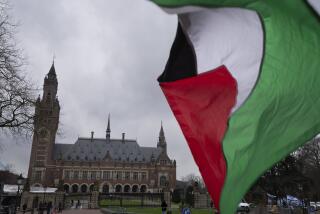NEWS ANALYSIS : U.N. Inspections Forever--a Bitter Pill for Iraqis to Swallow
- Share via
WASHINGTON — Iraq has surrendered to U.N. ultimatums time and again for more than two years, but the latest confrontation in Baghdad touches on the most sensitive and knotty issue of all: acceptance of inspections at its military installations forever.
Although defeat in the Persian Gulf War forced Iraqi officials to swallow a couple of dozen unpalatable resolutions from the Security Council, they have balked at accepting a humiliating resolution that would ensure perpetual inspections and permanent military weakness. Iraqis insist this resolution is an infringement on their sovereignty.
The Russian Foreign Ministry chastised Iraq on Tuesday for its “rash behavior” in the last two weeks, when it refused to allow U.N. inspectors to mount cameras to monitor two missile-testing sites. But Iraqi officials say they have a legal case for their position. This case is weak and somewhat confusing, however, and may not matter anyway if the Clinton Administration, Britain and France conclude that the time has come to bomb Baghdad again.
Although Iraqi officials insist that the U.N. measures against them are unprecedented, there are some historical parallels. The most obvious is the disarmament regime imposed on Germany by the Treaty of Versailles after World War I. In the end, Hitler violated the military restrictions with impunity, and the inspectors did nothing.
That chapter in history might indicate that time is on the side of the Iraqis. This is perhaps one reason why the United Nations is intent on forcing the issue soon.
Rolf Ekeus, the Swede who heads the U.N. Special Commission on Iraq, is due to arrive in Baghdad on Thursday. The Iraqis want to negotiate with him. But Ekeus says his mission is to make it clear that Iraq must allow the United Nations to monitor future missile tests with cameras. Otherwise, the testing equipment will be sealed or destroyed.
In a front-page editorial Tuesday, the Iraqi Defense Ministry newspaper Al Qadissiya, giving no hint of compromise, warned the public that new American air attacks might follow the Ekeus visit.
The controversy stems from two Security Council resolutions. The first, approved by the Security Council on April 3, 1991, was the cease-fire resolution that ended the Gulf War. Dubbed “the mother of all resolutions” by diplomats, this resolution amounted to a surrender document: The war would halt as soon as Iraq notified the council that it accepted all the provisions. Iraq did so, and the fighting stopped.
Under the provisions, Iraq agreed to the elimination of all its weapons of mass destruction and to “the future ongoing monitoring and verification” of Iraq’s pledge not to build up these programs again. The exact nature of this monitoring was not set down.
Six months later, the Security Council passed another resolution that promulgated a detailed program of perpetual inspections. The United Nations would have the right “to inspect, at any time and without hindrance, any activity, material or other item at any site or facility, including any material or other item in movement.”
Ekeus has complained several times that the Iraqi government has never announced its acceptance of this resolution.
The Iraqis take the position that, unlike the cease-fire resolution, the inspection resolution did not require their acceptance or rejection.
And they insist that the detailed procedures for the continuing inspections must be negotiated with Iraq rather than imposed.
More to Read
Sign up for Essential California
The most important California stories and recommendations in your inbox every morning.
You may occasionally receive promotional content from the Los Angeles Times.













